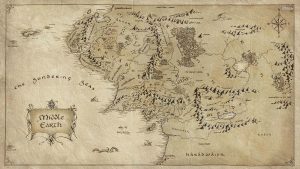

 A novel’s pronounced sense of time and place can determine, sometimes even singlehandedly, whether it sinks or swims for me: Lack of such a sense will almost certainly take away from my reading experience, whereas I’ll often find a novel that makes its setting literally stand up and become a character in its own right the greater for that element alone. In two of my favorite genres in particular – historical fiction and mysteries / crime fiction –, as well as in their hybrid child (historical mysteries), “nailing” the setting is absolutely crucial to my appreciation of the story; similar to the importance of imaginative world building in fantasy. But I’m also a particular fan of literary fiction and classic novels that draw substantially on the atmosphere, society and circumstances of their respective setting.
A novel’s pronounced sense of time and place can determine, sometimes even singlehandedly, whether it sinks or swims for me: Lack of such a sense will almost certainly take away from my reading experience, whereas I’ll often find a novel that makes its setting literally stand up and become a character in its own right the greater for that element alone. In two of my favorite genres in particular – historical fiction and mysteries / crime fiction –, as well as in their hybrid child (historical mysteries), “nailing” the setting is absolutely crucial to my appreciation of the story; similar to the importance of imaginative world building in fantasy. But I’m also a particular fan of literary fiction and classic novels that draw substantially on the atmosphere, society and circumstances of their respective setting.



So, what are your favorite novels that gain for having a strong sense of time and / or place? Here are some of mine:



* Hilary Mantel: The Cromwell trilogy (Tudor England) and A Place of Greater Safety (Revolutionary Paris / France from the POV of Danton, Robespierre & Desmoulins)
* Sharon Kay Penman: The Plantagenet and Welsh Princes series (medieval England and Wales)
* Robert Graves: I, Claudius and Claudius the God (imperial Rome)
* Iain Pears: An Instance of the Fingerpost (17th century Oxford), and The Dream of Scipio (Provence in the late 4th century, in the Middle Ages, and in the Vichy Era)
* Barry Unsworth: Morality Play (14th century England)
 * Louis de Bernières: Birds Without Wings (early 20th century / WWI Turkey)
* Louis de Bernières: Birds Without Wings (early 20th century / WWI Turkey)
* Victor Hugo: The Hunchback of Notre Dame (15th century Paris) and Les Misérables (early 19th century France)
* Alexandre Dumas (16th – 18th century France)
* Emmuska Orczy: The Scarlet Pimpernel (France under the Terror)
* Umberto Eco: The Name of the Rose (14th century Italy) and Baudolino (3d and 4th Crusade)
* Walter Scott (Scotland — various historic periods)
* Robert Louis Stevenson: Kidnapped (18th century Scotland, just after the Jacobite Uprising)
* Margaret Mitchell: Gone With the Wind (Civil War Atlanta)
* Colleen McCullough: The Thorn Birds (early 20th century Australia)
* Mary Novik: Conceit (17th century London / John Donne)
* Nathaniel Hawthorne: The Scarlet Letter and The House of the Seven Gables (17th and 19th century Massachusetts)
* Boris Pasternak: Doctor Zhivago (Russia before, during and after the 1917 Revolution)
* Giuseppe Tomasi die Lampedusa: The Leopard (late 19th century Sicily)
* Lion Feuchtwanger: Raquel, the Jewess of Toledo (late 12th century Spain), Jew Süss (18th century Germany), and Goya (18th century Spain)
* Frank Baer: Die Brücke von Alcántara (11th century Spain; not translated into English)
* Michael Chabon: Gentlemen of the Road (Caucasus, 10th century)
* Shūsaku Endō: Silence (17th century Japan)
* Amy Tan: The Joy Luck Club and The Kitchen God’s Wife (early 20th century China / contemporary San Francisco)

* Ian Rankin: The Inspector Rebus series (contemporary Edinburgh)
* Michael Connelly: The Harry Bosch and Lincoln Lawyer series (contemporary Los Angeles)
* Raymond Chandler: The Philip Marlowe series (1940s Los Angeles)
* George Pelecanos: various series and stand-alones set in Washington, D.C. (from the 1960s until now)
* Dennis Lehane: various series and stand-alones set in Boston (from the 1930s until now)
* Tony Hillerman: Navajo Country (from the 1970s until now)
* Colin Dexter: The Inspector Morse series (1970s – 1990s Oxford)
* Arthur Conan Doyle: Sherlock Holmes canon (Victorian and Edwardian London)
* Dorothy L. Sayers: The Lord Peter Wimsey series (1920s and ’30s London)

Historical Mysteries
* C.J. Sansom: The Shardlake series (Tudor England)
* Ellis Peters: The Brother Cadfael series (Medieval England)
* Walter Mosley: The Easy Rawlins series (Los Angeles, from 1948 onwards)
* Robert van Gulik: The Judge Dee series (Tang Dynasty China)


![]()
* Jane Austen (Regency England)
* The Brontë Sisters (Victorian Yorkshire)
* Elizabeth Gaskell (industrial Victorian England)
* Charles Dickens (Victorian London, and England generally)
* Thomas Hardy (19th century “Wessex”)
* E.M. Forster (England and Englishmen/ -women in the Edwardian Age)
* Thomas Mann: Buddenbrooks (19th century Lübeck) and The Magic Mountain (pre-WWI Europe — the Swiss setting is largely symbolic)
* Heinrich Mann: Der Untertan (The Loyal Subject) and Professor Unrat (The Blue Angel) (pre-WWI Germany)
* Klaus Mann: Mephisto (Nazi Germany)
* Theodor Storm: Der Schimmelreiter (The Dykemaster) (Northern Frisia)
* Günter Grass: Die Blechtrommel (The Tin Drum) (Danzig before and during WWII)
* Mark Twain: Late 19th / early 20th century Mississippi
* Henry James: Washington Square, The Europeans (late 19th century New York and Boston)
* Edith Wharton (late 19th / early 20th century New York)
* F. Scott Fitzgerald (Jazz Age New York)
* The “Holy Trinity” of 20th century Southern writers: William Faulkner, Eudora Welty, and Flannery O’Connor
* John Steinbeck (mid-20th century California)
* Wallace Stegner (19th and 20th century Western U.S.)
* Émile Zola (19th century France)
* Honoré de Balzac (19th century France)
* Fyodor Dostoevsky (19th century Russia)
* Naguib Mahfouz (Egypt, from the pharaohs to the 20th century)
* Salman Rushdie (India and Pakistan, chiefly in the 20th century)
* Khaled Hosseini: The Kite Runner (Afghanistan pre-, during and post-Taliban rule)
* Sharon Maas (20th century / contemporary India and Guyana)
* Roddy Doyle (20th century / contemporary Ireland)
* Dermot Bolger (20th century / contemporary Ireland)
* Edna O’Brien (20th century / contemporary Ireland)

Original post:
http://themisathena.booklikes.com/post/1208801/sense-of-time-sense-of-place
